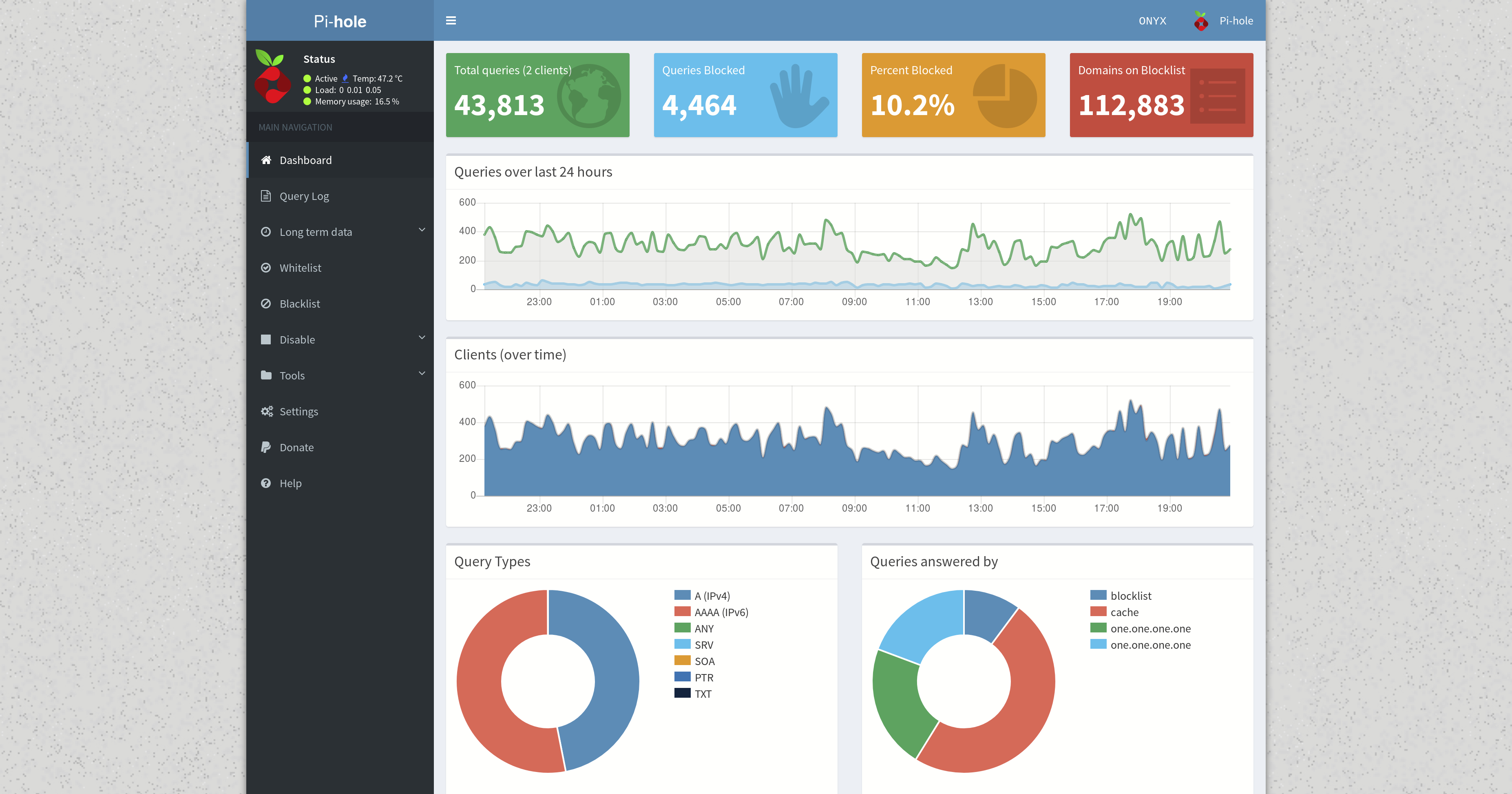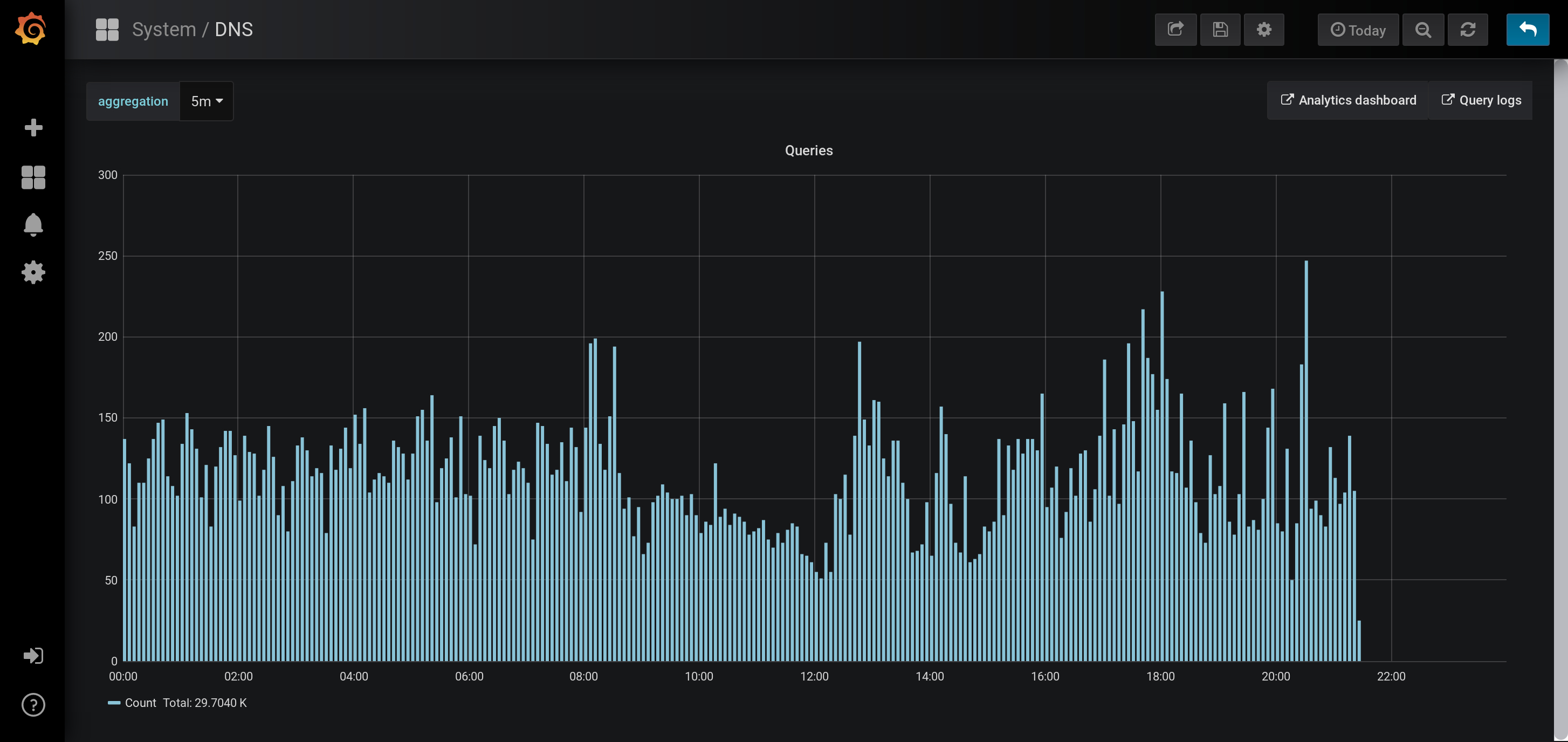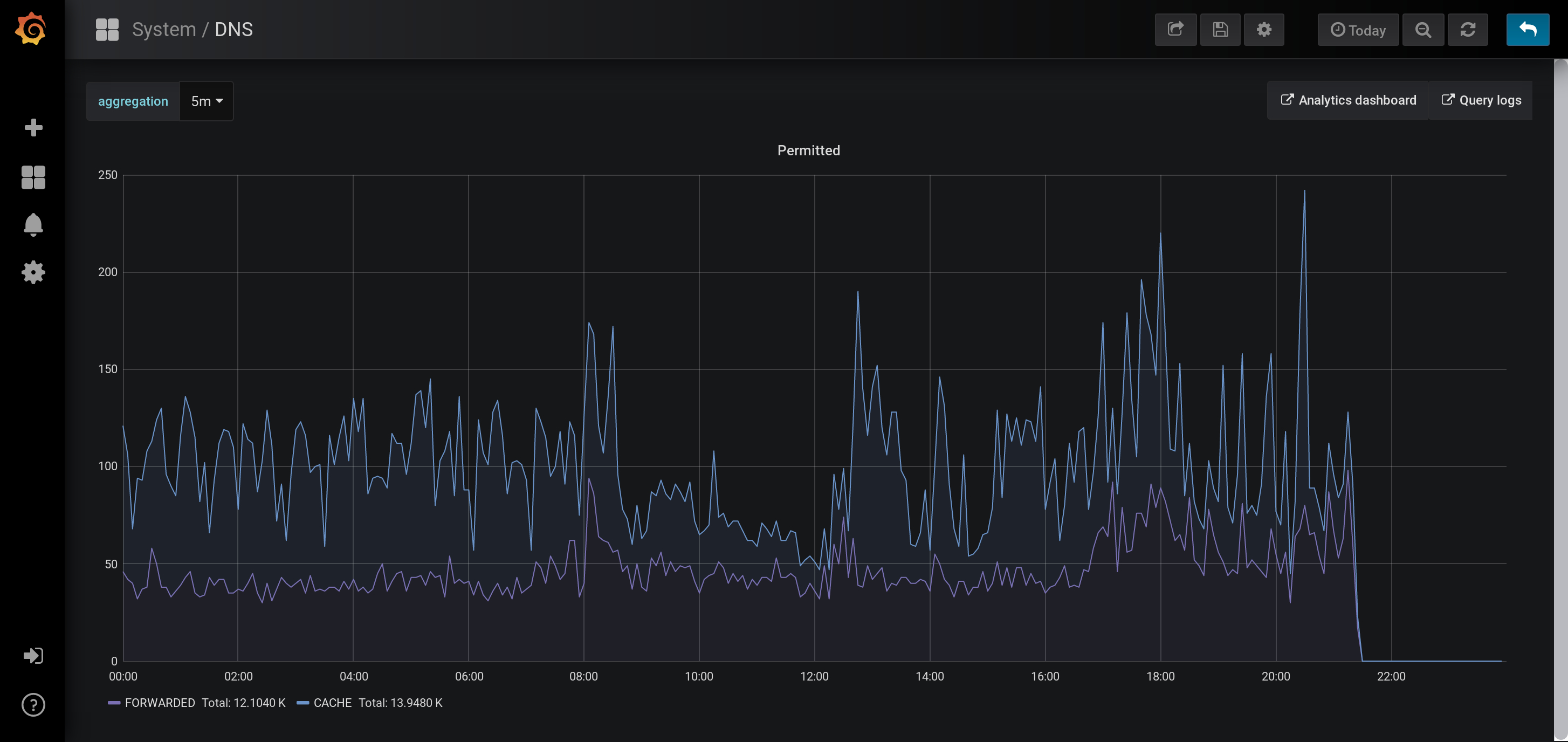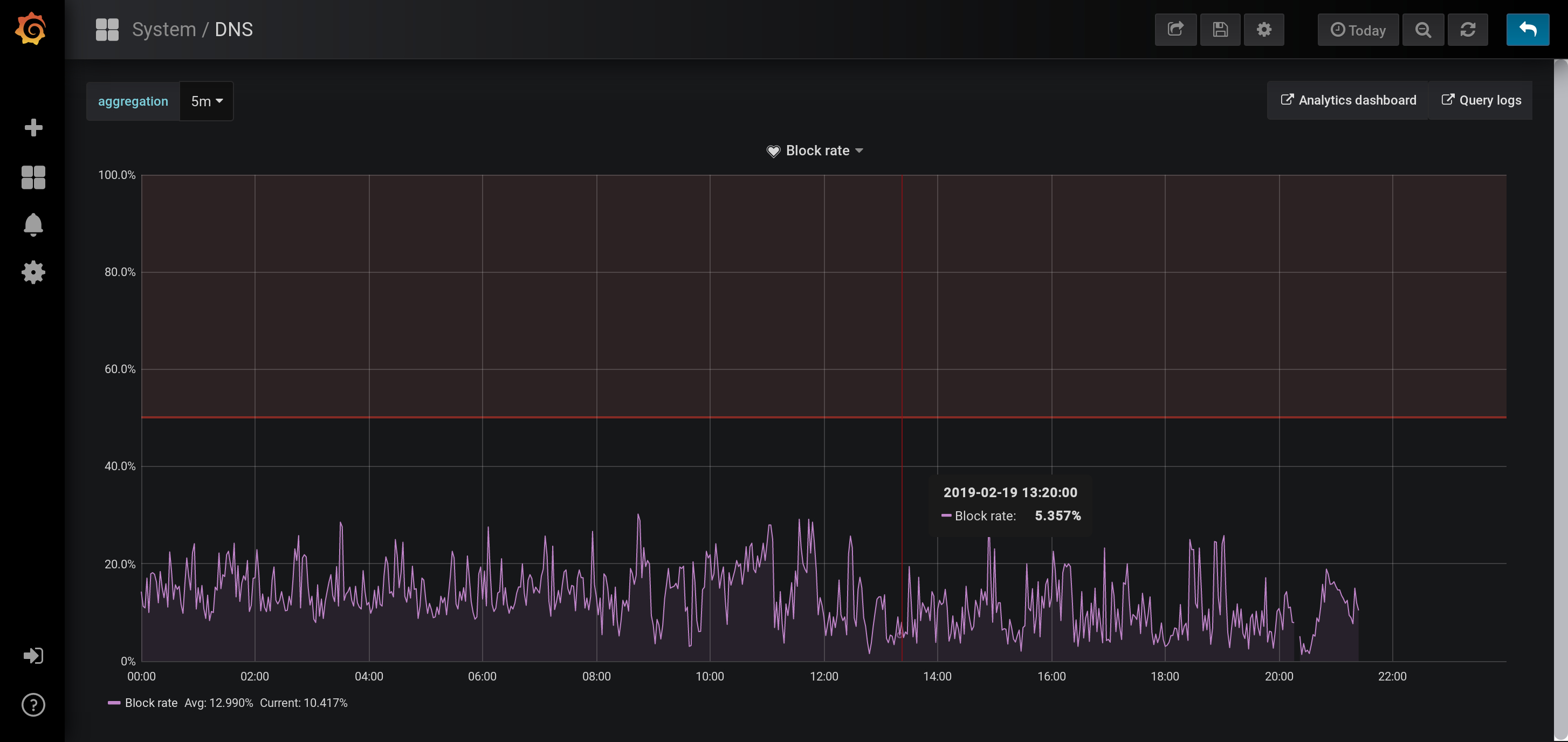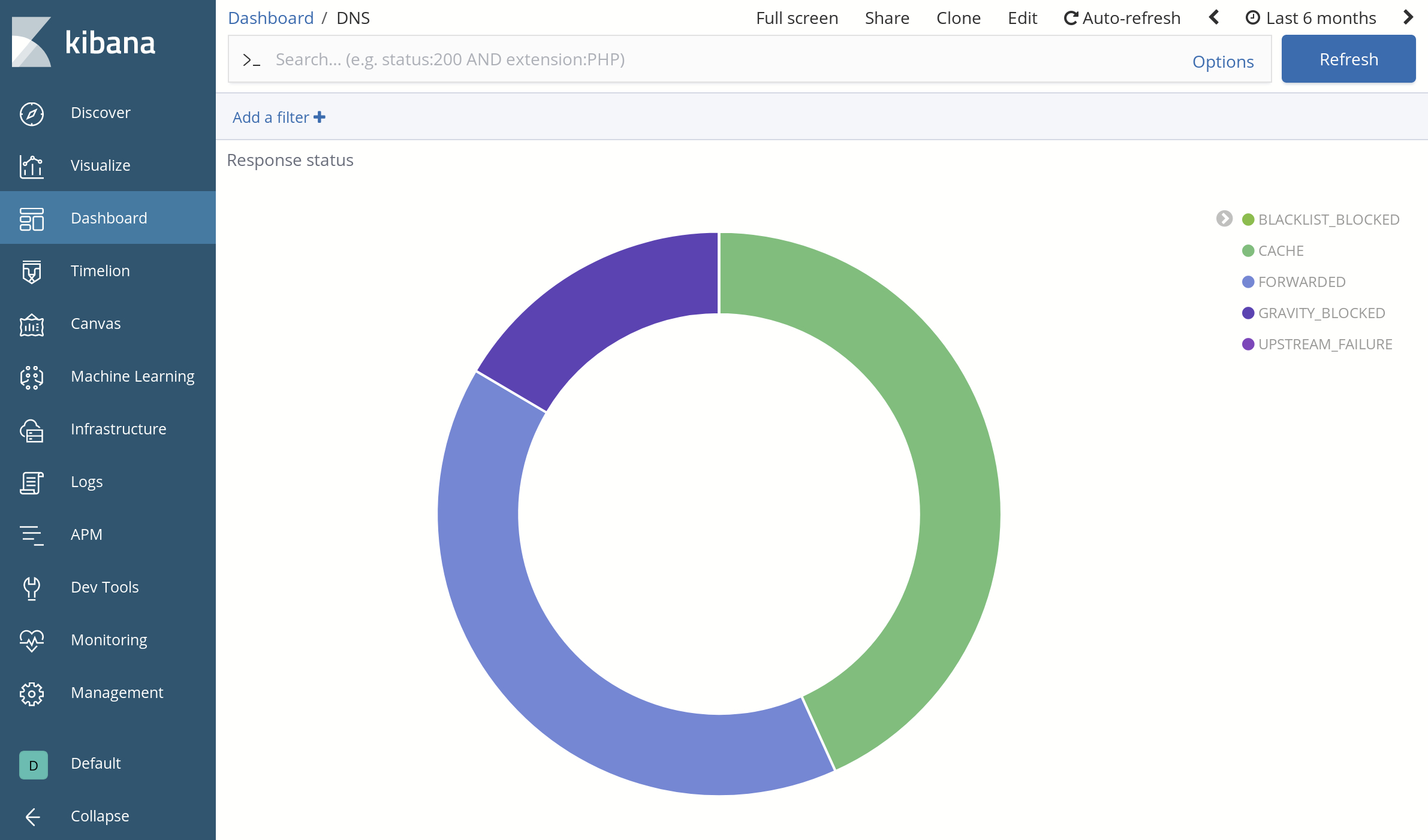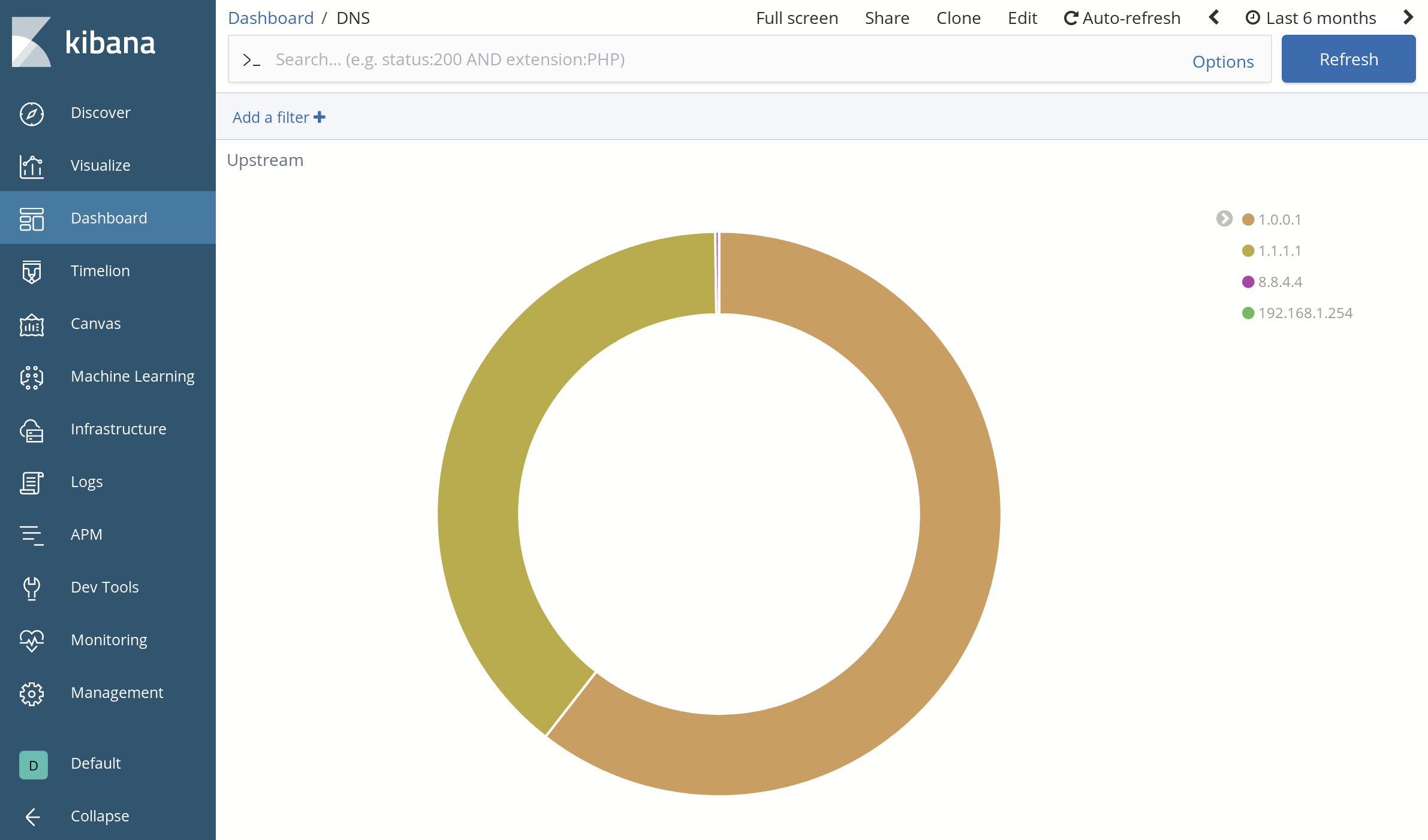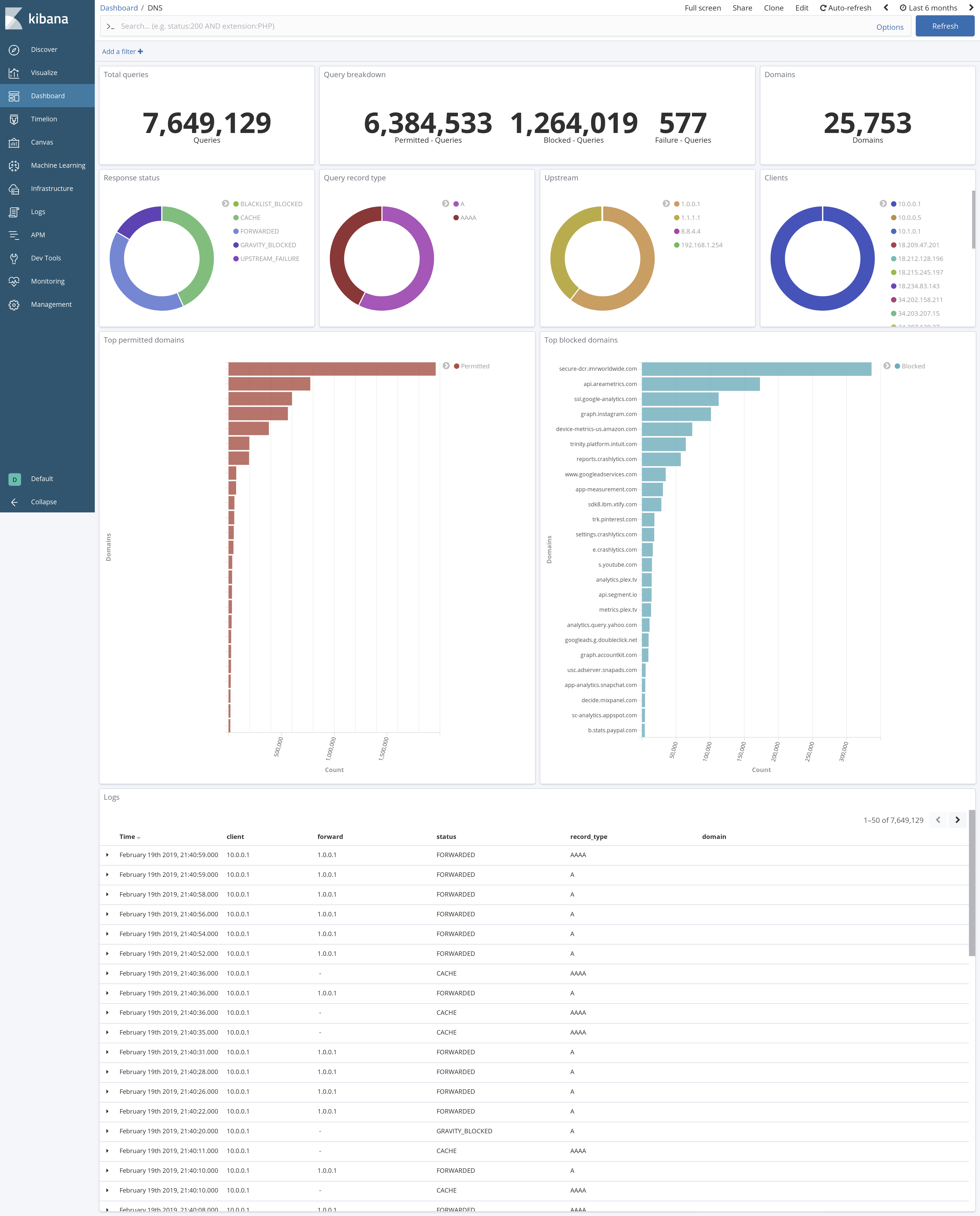February 20, 2019 / 6:13 AM
Ingestion Pipeline for Advanced Pi-hole DNS Analytics
projects
devops
Pi-hole
Pi-holeis a self-hostable DNS server suitable for deployment in small networks. It uses a rules engine to block resolution of certain hostnames (by resolving to 127.0.0.1) but otherwise forwards queries to an upstream of your choosing (with a reasonably well-behaved cache layer in between). Pi-hole does not itself implement a DNS server (it's just a set of nice abstractions on top of dnsmasq), but it is decently configurable and very easy to install on a single node.
I deployed Pi-hole in my network some time ago, and it has since served over 7.6 million DNS queries across ~10 clients. With minimal effort, it has provided several wins:
- Performance. Query patterns within my network result in about 30% of all DNS responses being served from the network-local cache. This significantly reduces resolution latency for popular domains by eliminating an additional forwarding hop outside of the network.
- Flexibility in blocking. A powerful rules engine for blacklisting domains has allowed very granular access control with zero client-side (device) configuration. Devices only need to be connected to my network; DHCP designates my router as the sole DNS server (which in itself uses the Pi-hole host as a single upstream). Clever clients who manually specify alternative DNS servers will have their ingress and egress traffic on port 53 routed to the Pi-hole host anyways with a router-level IP routing rule.
- Analytics. Pi-hole writes an audit log of all DNS queries, which acts as a rich source of data to provide detailed analytics into the behavior of all clients on the network.
The Problem with Pi-hole's Long Term Data
Pi-hole's long-term data analytics feature is not good.
- Audit logs are written to a SQLite database on disk. SQLite is both not a time-series datastore nor a search index, limiting Pi-hole's ability to efficiently perform aggregations across multiple dimensions. This is a fundamental requirement of almost all analytics workflows.
- The FTL implementation is so tightly coupled to SQLiteas a storage backend that supporting a more appropriate datastore would require significant modifications to the existing codebase. It's difficult to keep a fork in sync with the upstream when such a large chunk of the project is replaced.
- With tens of thousands of DNS queries answered per day, querying the SQLite long-term database is a very memory-intensive task. When running on commodity hardware, such queries will exhaust PHP and/or system memory, effectively preventing analytics on date ranges longer than a few days.
- Use of SQLite offers no flexibility to offload analytics computations to another host (without using a network-mounted filesystem or something equally inelegant).
- The web UI presents data aggregated along only a few interesting dimensions and offers visualizations with limited functionality and interactivity.
An Ingestion Pipeline for Advanced Analytics
There are existing open source databases suitable for time-series metrics and log indexing. All I needed was a mechanism to write all of Pi-hole's analytics data to these databases, instead of (or in addition to) local SQLite. My initial survey of possible solutions that didn't require modifying the Pi-hole codebase itself was mostly unsuccessful:
- The C sqlite3_update_hookAPI does not work across process boundaries, preventing the use case where a sidecar acts on SQLite data changes performed by another process in real-time
- The SQLite WAL format is OS-dependent and incredibly complex, thereby making an inotify-based WAL watcher difficult to debug and maintain
I opted for a simpler (though not real-time) solution: I'm open sourcing repliqate, the result of this effort. Repliqate is a general-purpose service that replicates SQL rows for append-only write patterns to a Kafkaqueue, whose consumers can ingest the data to a datastore of their choice. Repliqate is designed to be maximally data-agnostic (but supports the Pi-hole workflow as the ideal case), fault-tolerant, and appropriate for use in a distributed system with multiple concurrent data consumers and producers.
Currently, repliqate's Kafka topic has two consumers: Telegraf, for ingestion into InfluxDB(time-series analysis) and Logstash, for ingestion into Elasticsearch(indexing and searching). I use Grafanaand Kibanaas visualization frontends, respectively.
This has afforded the opportunity to efficiently explore long-term DNS query patterns with greater depth than that offered natively by Pi-hole. For example:
Historical query volume: DNS requests served at various hours of the day
Historical cache hit rate: Frequency of requests served out of Pi-hole's local cache
Alerting on anomalies in block rate: Automated monitoring for rogue clients when a threshold number of their requests are blocked in a fixed time interval
Aggregating by response status: Visibility into the types of DNS responses returned to clients
Load balancing among upstreams: Query volume to all DNS servers configured as forwarding upstreams
These analytics are summarized in some nice dashboards (some details below are deliberately obfuscated):
This was a fun project and provided some interesting insights into how devices on my network talk to the outside world. You can learn more about Pi-hole on its websiteor check out repliqate on Github.
Appendix
If you're interested in setting up a repliqate instance for your own Pi-hole server, this config works well for my use case:
repliqate:
name: dns
statsd_addr: localhost:8125
redis_addr: localhost:6379
replication:
poll_interval_sec: 300
sql_source:
uri: sqlite:////etc/pihole/pihole-FTL.db
table: queries
primary_key: id
fields:
- id
- timestamp
- type
- status
- domain
- client
- forward
limit: 500
kafka_target:
topic: repliqate-dns
brokers:
- 127.0.0.1:9092The Telegraf config I use for InfluxDB ingestion:
[[inputs.kafka_consumer]]
brokers = ["localhost:9092"]
topics = ["repliqate-dns"]
consumer_group = "telegraf"
offset = "oldest"
data_format = "json"
json_query = "data"
name_override = "dns_query"
tag_keys = ["client", "forward", "type", "status"]
json_time_key = "timestamp"
json_time_format = "unix"And the Logstash config I use for Elasticsearch ingestion:
input {
kafka {
bootstrap_servers => "localhost:9092"
topics => "repliqate-dns"
group_id => "logstash"
type => "dns"
}
}
filter {
if [type] == "dns" {
json {
source => "message"
}
date {
match => ["[data][timestamp]", "UNIX"]
}
translate {
field => "[data][type]"
destination => "[record_type]"
dictionary => {
"1" => "A"
"2" => "AAAA"
"3" => "ANY"
"4" => "SRV"
"5" => "SOA"
"6" => "PTR"
"7" => "TXT"
}
fallback => "UNKNOWN"
}
translate {
field => "[data][status]"
destination => "[status]"
dictionary => {
"0" => "UPSTREAM_FAILURE"
"1" => "GRAVITY_BLOCKED"
"2" => "FORWARDED"
"3" => "CACHE"
"4" => "WILDCARD_BLOCKED"
"5" => "BLACKLIST_BLOCKED"
}
fallback => "UNKNOWN"
}
mutate {
rename => {
"[data][id]" => "[id]"
"[data][domain]" => "[domain]"
"[data][client]" => "[client]"
"[data][forward]" => "[forward]"
}
}
mutate {
remove_field => ["message", "timestamp", "name", "table", "data", "hash"]
}
}
}
output {
if [type] == "dns" {
elasticsearch {
hosts => ["localhost:9200"]
index => "dns-%{+YYYY.MM}"
document_type => "dns"
document_id => "%{[id]}"
# The template here just defines "client" and "forward" to be IP fields.
# It's not strictly necessary.
manage_template => true
template => "/etc/logstash/templates.d/dns.json"
template_name => "dns"
template_overwrite => true
}
}
}(You can always write your own Kafka consumer to execute arbitrary logic.)

